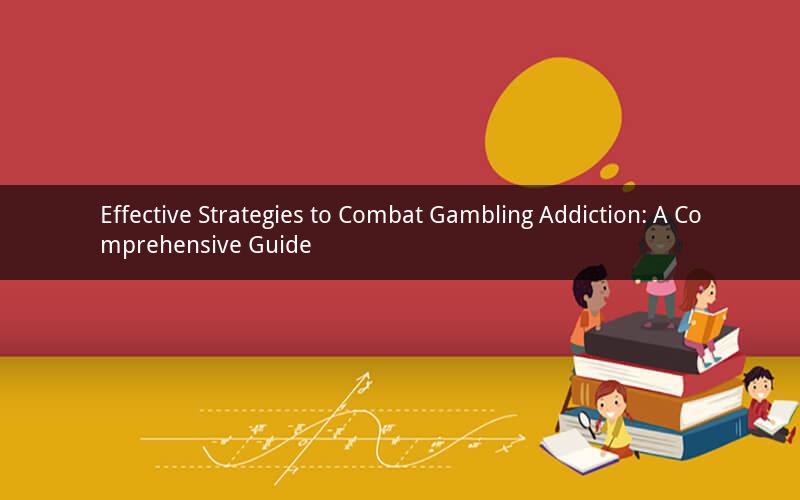
Gambling addiction, a form of compulsive behavior, can lead to severe consequences including financial, emotional, and social problems. Understanding how people stop gambling is crucial in addressing this issue. This article explores various strategies and techniques that individuals can adopt to overcome their gambling addiction.
1. Acknowledge the Problem
The first step in overcoming gambling addiction is to acknowledge that there is a problem. Many individuals may downplay their gambling habits or believe they can control their behavior. However, recognizing the negative impact of gambling on their lives is essential in initiating the recovery process.
2. Seek Professional Help
Seeking professional help is a vital step in overcoming gambling addiction. Therapists, counselors, and psychologists specializing in addiction can provide personalized support and guidance. They can help individuals identify the underlying causes of their gambling addiction and develop coping strategies to manage their cravings.
3. Build a Support System
Building a strong support system is crucial in overcoming gambling addiction. This can include family members, friends, or support groups dedicated to helping individuals with gambling addiction. Sharing experiences and receiving encouragement from others who understand the challenges can significantly improve the recovery process.
4. Develop Financial Strategies
Gambling addiction often leads to financial difficulties. Developing financial strategies is essential in overcoming addiction. This may involve creating a budget, seeking financial counseling, or seeking legal advice to address any outstanding debts. By addressing financial issues, individuals can reduce the temptation to gamble.
5. Identify Triggers and Avoid High-Risk Situations
Identifying triggers and avoiding high-risk situations is crucial in preventing relapse. Triggers can be anything that prompts a desire to gamble, such as certain places, people, or emotions. By avoiding these triggers, individuals can reduce the likelihood of relapse.
6. Practice Self-Regulation Techniques
Self-regulation techniques, such as mindfulness, meditation, and relaxation techniques, can help individuals manage their cravings and reduce stress. These techniques can be particularly beneficial in preventing relapse by promoting emotional well-being and self-awareness.
7. Engage in Healthy Activities
Engaging in healthy activities can provide a positive alternative to gambling. Activities such as exercise, hobbies, and socializing with friends can help individuals fill their time and reduce the temptation to gamble. Additionally, these activities can improve overall well-being and reduce stress.
8. Set Realistic Goals and Celebrate Progress
Setting realistic goals and celebrating progress is crucial in maintaining motivation and overcoming gambling addiction. Individuals can set short-term and long-term goals, such as attending therapy sessions or avoiding gambling for a specific period. Celebrating these milestones can provide a sense of accomplishment and reinforce the recovery process.
9. Learn from Relapse
Relapse is a common occurrence in the recovery process. It is important to learn from relapse and not view it as a failure. Analyzing the reasons behind the relapse can help individuals identify areas that require further attention and develop strategies to prevent future relapse.
10. Maintain Sobriety
Maintaining sobriety is essential in overcoming gambling addiction. This involves continued support from professionals, a strong support system, and adherence to healthy habits. By remaining vigilant and committed to recovery, individuals can increase their chances of long-term success.
Questions and Answers:
1. Q: How can I identify if I have a gambling addiction?
A: Signs of gambling addiction include an inability to control gambling behavior, hiding gambling activities, feeling restless or irritable when not gambling, and experiencing financial, emotional, or social problems due to gambling.
2. Q: What are some common triggers for gambling addiction?
A: Common triggers include financial stress, boredom, social pressure, and certain emotions like anxiety or depression.
3. Q: Can therapy help me overcome gambling addiction?
A: Yes, therapy, particularly cognitive-behavioral therapy (CBT), can be highly effective in helping individuals overcome gambling addiction. Therapists can provide personalized strategies to manage cravings and address underlying issues.
4. Q: How can I build a strong support system for overcoming gambling addiction?
A: Building a strong support system involves seeking help from family members, friends, support groups, and professionals. Sharing experiences and receiving encouragement from others who understand the challenges can be incredibly beneficial.
5. Q: What can I do if I relapse after overcoming gambling addiction?
A: If you relapse, it is important to analyze the reasons behind the relapse and seek support from your therapist or support group. Learn from the experience and develop strategies to prevent future relapse. Remember that relapse is a part of the recovery process, and it does not mean you have failed.